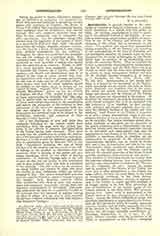

Appropriation, in general, consists in the attribution to a person or thing of a character or quality which determines in a special way this person or thing. In theology, appropriation is used in speaking of the different Persons of the Trinity. It consists in attributing certain names, qualities, or operations to one of the Persons, not, however, to the exclusion of the others, but in preference to the others. The qualities and names thus appropriated belong essentially to all the Persons; yet, according to our understanding of the data of revelation and our theological concepts, we consider some of these characteristics or names as belonging to one Person rather than to another, or as determining more clearly this particular Person. Thus we consider the Father as particularly characterized by omnipotence, the Son by wisdom, and the Holy Ghost by love, though we know that the three have essentially and by nature an equal omnipotence, wisdom, and love (cf. St. Thomas, Summa Theologica, I, Q. xxxix, a. 7; Franzelin, De Deo Trino, Rome, 1881, Th. xiii, 216). Appropriation is not merely arbitrary; it is based on our knowledge of the Trinity, which knowledge has its sources and rules in Revelation (Scripture and tradition) and in the analogies which our reason discovers between created things and persons and the Persons of the Trinity as these persons are represented in Revelation. Of necessity, we understand the data of Revelation only under human. concepts, that is, in an analogical way (see Analogy). It is, therefore, by their analogy with creatures and created relations that we conceive the different Persons of the Trinity and their relations. Each Person of the Trinity is presented to us with a proper characteristic which is the constitutive element of the personality. Remarking, as we do naturally, that among creatures certain attributes, qualities, or operations are the properties of the person possessing such a characteristic, we conceive the Trinity after this remote suggestion, though in an analogical and supereminent way, and we appropriate to each Person of the Trinity the names, qualities, or operations which, in creatures, are the consequences or properties of this characteristic. Appropriation, therefore, has its source in revelation, and it has its foundation and rule in the very characteristic which constitutes each distinct personality in the Trinity and the relations existing between the essential properties of the Divine Nature and this constitutive characteristic of each person—these relations in God being known by analogy with the relations existing between these same properties and this same characteristic in creatures (St. Thomas, be. cit.; Franzelin, loc. cit.). Among the names used in speaking of the Persons of the Trinity, the name God is often appropriated to the Father, the name Lord to the Son, the name Spirit, in the sense of immaterial substance, to the Third Person. Among the Divine attributes, eternity is appropriated to the Father, as source and first principle of all things; beauty to the Son, Who, proceeding by way of intelligence, is the perfect image of the Father; fruition to the Holy Ghost, Who proceeds through love. Again; unity is appropriated to the Father, truth to the Son, and goodness to the Holy Ghost. Among the Divine attributes of action and operation, omnipotence is appropriated to the Father, with all the operations which it implies, especially creation; wisdom and its works, especially the order of the universe, to the Son; and to the Holy Ghost, charity and its works, especially sanctification (cf. Denzinger, Enchiridion, n. 2, 3, etc., 17, 47). Again, efficient causality with the production of all things is appropriated to the Father; exemplary causality with the organization of all things, to the Son; final causality with the conservation and perfecting of all things, to the Holy Ghost [cf. St. Thom., “Summa Theol.”, I, Q. xxxix, a. 8; E. Dubois, “De Exemplarismo Divino, “XII, -§ 4 (Rome, 1897)]. Appropriation as a theological method or theory is of comparatively recent origin. But from the beginning of Christianity, it was used as a spontaneous expression of the Catholic conception of the Trinity. It has its source, as already said, in Scripture and in tradition. In Scripture it is used notably by St. Paul (cf. Ephes., i, 3; iv, 4-6; Rom., xv, 9; II Cor., i, 3; xi, 31; of. also, I Pet., i, 3). In tradition it is expressed especially in the formulas of faith, or Symbols (cf. Denzinger, “Enchiridion”, n. 2-13,17, 47); in liturgy, and especially in doxologies (cf. Dom Cabrol, “Le livre de la priere antique”, xix, Poitiers, 1900); in inscriptions and pictures (Franzelin, op. cit.; H. Marucchi, “Elements d’archeologie chretienne”, Rome, 1900). As early as the third century with Origen, later with St. Gregory of Nyasa, St. Basil, St. Gregory Nazianzen, and others, the Greek Fathers speak of the kleseis, or divine appellations, though it cannot be said yet that they furnish a theory of appropriation (De Regnon: Etudes de theologie positive sur la S. Trinite, etudes xvii, xxv, Paris, 1898). This theory is established by the Latin Fathers of the fourth and fifth centuries, especially by St. Hilary, “De Trinitate”, II, n. 1; P.L., t. X, col. 50; St. Augustine, “De Trinitate”, VI, x, P.L., t. XLII, col. 931; St. Leo the Great, “Sermo de Pentecoste”, LXXVI, iii, P.L., t. LIV, col. 405. In the Middle Ages, the theory was accepted, completed, and systematically taught by the Schoolmen (cf. St. Bonaventure: In I Sent. dist., xxxiv, q. iii; Opera, Quaracchi, 1883, t. 1b, 592; St. Thom., Sum. Theol., le pars., Q. xxxix, a. 8). Abelard, who considered the appropriated qualities as belonging exclusively to the Person made the subject of appropriation, was condemned in the Council of Sens (1141) and by Innocent II.
GEORGE M. SAUVAGE

